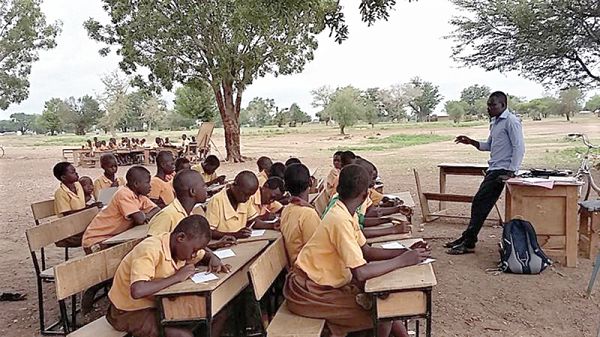
Corporal punishment, compliance with ban needs more than ‘threat’ of sanction
I keenly monitored many basic and second cycle school teachers’ reactions to the recent directive by the Ghana Education Service (GES) on the ban on corporal punishment.
It is conclusive that this directive will be complied with (for a short period), not by teachers’ understanding and appreciation of the essence of the directive, but for fear of the "threat" of sanction.
You'll agree with me this is not the first time this instruction on the ban on corporal punishment is coming from the GES.
That is why I believe the directive will mean nothing in seven to 10 years to come if a conscious effort is not made by the GES to ensure teachers naturally embrace the directive and comply with it because they (the teachers) realise it’s a better way to promote an effective teaching and learning environment in this era.
Teachers unwillingly embracing the directive gives me two fears:
1) we’re going to defeat one of the essences of banning corporal punishment in schools; thus to ensure a safe school environment for all children.
2) Our society is on the verge of becoming increasingly morally derailed and indiscipline in society skyrocketing; not because teachers are not to use the cane, but because teachers are going to turn a blind eye to unruly students. The viral video of a teacher who left his/her students to fight because of the directive confirms my fears.
Before I proceed, let me indicate my strongest condemnation of that video and also to all comments I’ve heard and read from teachers that henceforth, they'll only go to the classroom to teach – whether the child comes to school late, doesn't do assignments, engages in violence or abuses another student, they (the teachers) careless.
In a world that is littered with conflict at all levels, teachers should see it as an opportunity to engage their students on how to resolve conflict among themselves when one arises.
Teachers’ Code of Conduct
The ban on corporal punishment is in the very Act (Education Act, 2008 (Act 778)) that regulates the Education Service and even the Teachers’ Code of Conduct itself frowns on it. Article 8 of the code seeks the “Protection of Children from Torture and Other Degrading Treatments."
I’ve mentioned elsewhere that even if we don’t want to argue the case of corporal punishment on the back of the child’s right, we can do that on the harms it has caused many children. I don’t want to recount the story of three of my primary school mates who dropped out of school because of the cane.
Like before, our society is sharply divided on the ban, with some opponents believing it is an imported western policy.
Such people added, “We cannot solve Africa's problems with western solutions."
I don’t know how students’ misbehaviour became only an African problem. This belief was a reason why the directive couldn’t work in the past.
The majority of Ghanaians believe the avoidance of the cane can’t work in our country. It’s not surprising some parents send their children to teachers to be caned.
The origin
We need to understand that the use of corporal punishments in our schools was not introduced by us Ghanaians.
It was done by our colonial masters; the very people who grounded education in this country.
Corporal punishment was a common practice in British schools because of the doctrine of in loco parentis which origins from English common-law.
By Loco parentis, “school officials stand in for parents as comparable authority figures."
It "allows colleges and schools to act in the best interests of the students as they see fit."
Flogging, spanking or smacking became disciplinary tools teachers considered as ways of acting in the child's “best interest."
This same doctrine was brought into our school. Teachers were empowered to discipline students even by the use of the cane.
Britain in its many years of practice has seen that corporal punishment wasn't acting in the "best interest” of the students.
By 1987, it outlawed corporal punishment in all state schools, and recently for all schools.
If the people whom this practice originates from no longer subject their children to physical abuse in schools, why should we?
Safe learning environment
As a society, we need to understand that corporal punishment is nothing that is in the interest of the child and teachers’ understanding of this will help reshape the mindset of society on corporal punishment even in our homes.
That is why it is not enough for GES issuing a directive on the ban.
It must take steps to ensure teachers are on the same page with them by understanding that education has evolved and classroom management has also taken a different approach.
Having teachers to comply with this because of the "threat" of sanction against anyone who flouts the order will increase teachers' posture of "leave-their-children-to-them-to-misbehave”; something that viral video and other social media comments by teachers have highlighted.
That will not order well for discipline in our society.
In conclusion, teachers must understand that they have a duty of creating a safe learning environment for every child.
Their failure to adopt positive disciplinary measures against students’ unruly behaviour will only increase the situation of some students being violent against their colleagues – a situation that defeats one of the essences of the ban on corporal punishment (promoting a safe school).
Bad practices that used to be the norm in the 19th and 20th centuries can't still hold today.
That is the time teachers' training on ensuring rules and order in their schools without the use of corporal punishments is being tested. They should adopt their innovations to set a new precedence.
The writer is an Educator and Education Advocate (Email:
